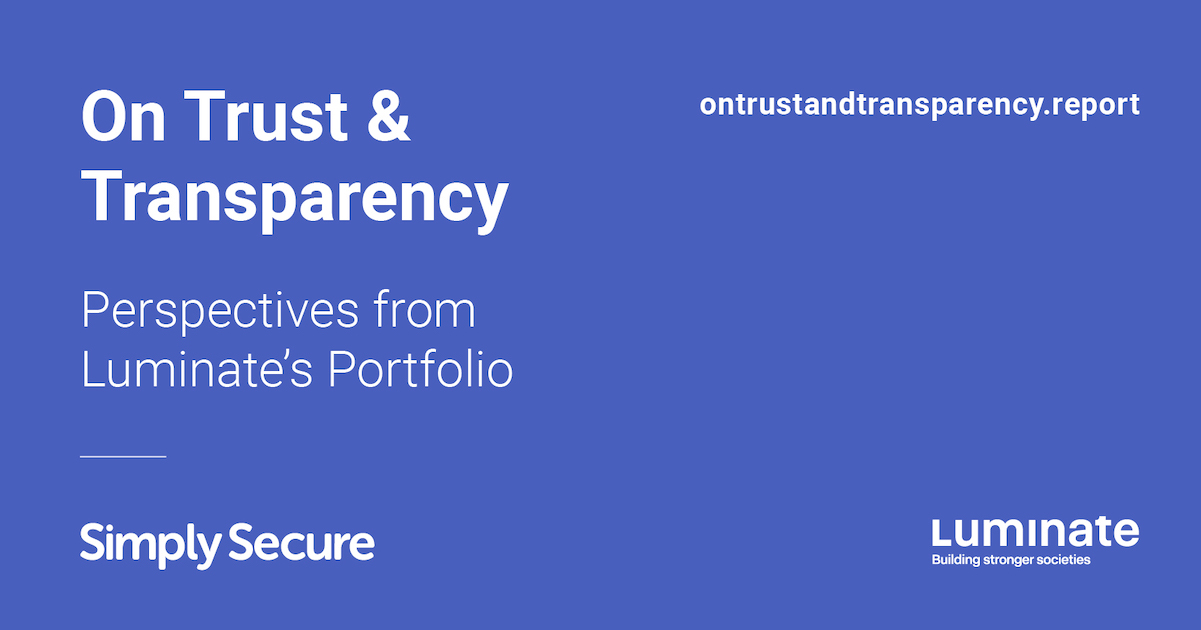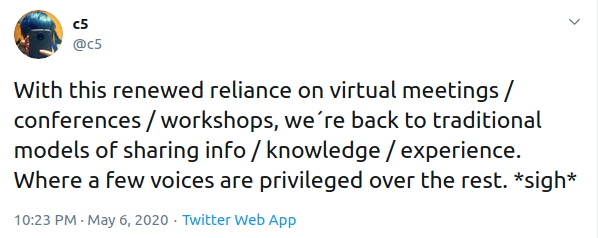Ask most funders who hold the power in the grantmaker/grantee relationship, and they’d readily admit that they have the ability to make or break the organizations they support. In many ways, this is an unavoidable part of being part of the funding space. Organizations need what they have to offer, and you are in the position of deciding to what degree that need gets met.
However, just because the grantee/grantmaker relationship has a built-in asymmetry doesn’t mean that it’s not productive to notice and learn about the way the relationship looks in your organization.
What does a harmful power dynamic look like?
Here are some examples of practices that contribute to a harmful power dynamic:
- Requesting inputs from grantees and communities, costing them time, yet don't act on it.
- Bragging about diversity, equity, and inclusion (DEI) policy but don't put it into practice.
- Putting BIPOC or women founders in their funder 'PR' spotlight by having them do freewriting, tweeting, attendance at summits or events without offering concrete funding support.
- Expecting applicants/grantees to have access to banks, legal help, 'developed world' infrastructure.
Are you part of the problem? These are tools and resources to help you identify asymmetries and, where desired, bring you and your grantees onto a more equal footing.
1. Acknowledge your power and privilege
This list highlights some of the most common forms of privilege that might render the power dynamic between you and your grantee partners harmful:
- Wealth: This is the most obvious source of your power. It is one of the reasons that enable you to be a funder in the first place. With wealth, you have the ability to make or withhold grants and investments. Your money has the power to make a big impact on people's livelihoods and things they get to work on.
- Status: You hold a high position in your organization or in society as an individual. This also means that you are likely to have connections to decision-makers in society, access to a corridor of power, etc. You often find people seeking your opinion and agreeing with you rather than challenging you.
- Information/Knowledge: As a funder, you have access to more resources and insider knowledge of the funding landscape. This ostensibly creates an information asymmetry in your relationship. Your inherent and learned knowledge about the funding space can lead you to make assumptions without realizing it. You lead from a place that assumes everyone has the knowledge you do or access to the knowledge you do.
- Security/Stability: Your livelihood is dependent on giving out grants/funding and gaining reports and reporting back to your own funders but you are more likely to be in a stable place than the applicants you are funding.
- Ability to set norms and rules: You have full control over the boundaries of funding programs. You actively participate in the process of deciding how the funding systems work.
- Independence: Your independent wealth enables you to take more risks. You are able to go against the grain and support unpopular causes as well as address immediate needs or work towards systemic change.
2. Are you creating a harmful power dynamic?
This is a self-reflection tool for you funders to assess your practice, culture, value, and approach to leadership. It is adapted from the Trust-based Philanthropy Self-Reflection Tool by the Trust-based Philanthropy Project.
Instructions
- For each one of these statements, please answer “Yes,” “Trying, but not there yet,” or “No.”
- Give yourself a 2 for every “Yes,” a 1 for every “Trying,” and a 0 for every “No.”
Part 1. Grantmaking Practice
- We give multi-year grants.
- Our grant application process requires less time and effort than the average process.
- We don't have strict deadlines for our funding programs
- Our practices are continually informed by feedback from grantee partners and community members.
- We are transparent with prospective and current grantees about our funding priorities and decisions.
- When reporting, we only request the information we need from grantees, via methods they can easily access.
- We respond to calls and emails from grantees and prospective grantees within 1-3 working days.
- We “keep ourselves honest” by using external partners for evaluation.
- We do the homework and put the onus of due diligence on ourselves rather than the grantees.
- We carefully read everything that grantees send to us.
- We have a streamlined reporting process that does not require grantees to report on every detail of what they did with the grant money.
- We offer our grantee non-financial support such as: facilitating capacity building workshops, providing access to relevant resources, introductions to other funders, et cetera.
- Our grantee applicants are reviewed by staff members and an advisory board that is made up of trusted community members.
- We integrate threat modeling and risk assessment into our funding program design.
- We conduct accessibility and security assessments throughout our grantmaking process.
- We work with the community to co-design a meaningful definition of success rather than fixed, vanity metrics.
- We encourage applicants to submit their applications and proposal in their native languages.
- Our funding platform, including our application form, is available in multiple languages.
Part 2. Leadership
- Our board is comprised of people that have their own experience of being an applicant/grantee.
- Our board is guided/shaped by humility, empathy, and vulnerability.
- Our board practices model, honest, and transparent communication.
- Our board creates a climate where all questions and ideas are welcome
- Our board places a high level of trust in our executive leadership and staff’s decision-making.
- Our board’s role is predominantly focused on guiding our big picture strategies and endowment (rather than approving grants or reviewing dockets).
- Our board represents or engages with the perspectives of the communities we seek to serve.
- Our board is open to new possibilities and transformation, even when they are difficult or threatening.
- Our executive staff demonstrates humility, empathy, and vulnerability.
- Our executive staff places a high level of trust in the staff’s decision-making.
- Our executive staff practice open, honest, and transparent communication.
- Our executive staff is not afraid to admit failure and learn from mistakes.
Part 3. Culture
- We have a culture of seeking and providing honest feedback among staff.
- We block time for dialogue, reflection, and learning among staff on a regular basis.
- We block time for difficult conversations about power, privilege, and equity on a regular basis.
- Our staff understands how the philanthropy sector has historically contributed to and benefited from systemic inequities.
- We are open to new possibilities and transformation, even when they are difficult or have potential risks.
- We acknowledge and respect grantee partners as experts in their work.
- We give grantee partners agency over their projects.
- We have diversity, equity, and inclusion (DEI) policy in place.
- We dedicate time and space for grantee partners to open up to us about their needs and challenges.
- Our approach to evaluation is focused on learning and growth rather than on holding grantee partners accountable to impact metrics.
- We invest in staff training programs on subjects such as diversity, equity, cross-cultural communication, racism, et cetera.
- We seek feedback from grantee partners and community members before instituting policy or practice changes.
Part 4. Values
- Our organization's work is guided by a clearly articulated set of values
- Our values serve as a touchstone for decision-making, especially during times of uncertainty or change.
- Each of our departments references our organization’s values in their work (i.e. learning & evaluation, grants management, finance, legal, etc.
- Our grantee partners’ perspectives and contributions are essential to our organization’s strategy and goals
- We believe sharing power with grantees and community partners makes us more impactful as funders.
- We see ourselves as accountable to our grantee partners.
- Reflection and learning are key to our and our grantee partners’ growth and evolution.
Reflection Prompts
1) Has there been growth or change around these four areas over the last 6-12 months? What factors contributed to that change (or lack thereof)?
2) Did the prompts raise any new questions or insights about your organization as a whole?
3) Which of the four areas had higher scores? Which had lower scores?
4) Was there anything interesting or unexpected about how your scores turned out? Any areas with less consensus? Any contradictions?
5) Of the sections that ranked lower, where can you make some realistic changes or adjustments?
6) Of the sections that ranked higher, where can you extend the horizon for your practice?
7) What is one specific area that your organization can work on over the next 6-12 months? Who needs to be involved in that process
3. Recommended action to counter asymmetrical power dynamic
Grantmaking Practices
- Conducting accessibility and security assessments throughout the grantmaking process.
- Working with the community to co-design meaningful definitions of success rather than fixed, vanity metrics.
- Offering genuine space for your staff members to challenge and engage in dialogue around requests, processes, funding requirements, and even strategy.
- Making the due-diligence process more transparent to applicants.
- Facilitating open and honest conversations with grantees about expectations and processes.
- Encouraging applicants to submit their application and proposal in their native languages and their preferred formats such as video/spoken responses rather than transcribed/written ones.
- Working against a culture that asks for 'previous experience/CVs, etc' in order to be 'a good applicant' similar with 'academia & published papers'.
- Building in more opportunities for iterative feedback and learning with grantees.
- Understanding and having support plans in place for crises in the applicants/grantee's place/country of residence.
Culture & Values
- Explore opportunities for training and professional development to help staff build awareness of power dynamics and skills for how to communicate and navigate them more effectively.
- Diversifying your network and the target grantee groups by intentionally engaging with communities beyond the types of entities and approaches that you are most familiar and comfortable with, and questioning your frame of reference for what is a good fit.
Learn more








